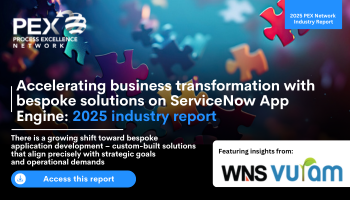Data analytics helps International Myeloma Foundation enhance patient care
International Myeloma Foundation uses data analytics to reduce time to diagnosis for patients, improving experiences and care
Add bookmark
The International Myeloma Foundation (IMF) is an American non-profit organization serving patients with myeloma, a cancer of plasma cells in the bone marrow. The IMF’s reach extends to more than 525,000 members in 140 countries worldwide, dedicated to improving the quality of life of myeloma patients while working toward prevention and a cure. The IMF also provides support and information for family members, caregivers, physicians and nurses.
The organization recently sought to use data analytics to reduce the time to diagnosis for patients and improve their experiences and care, Yelak Biru, president/CEO of IMF, tells PEX Network. Prior to IMF, Biru served as the senior director of data analytics at Walmart and as global director of advanced analytics and business intelligence architecture at PepsiCo.
Traditionally, patients rely on meetings with their providers to fully understand the context of their situation and what their next steps are. The IMF wanted to empower patients to take more control over their own health journeys and provide them with a predictive analytics-based platform that offers guided knowledge about their disease’s stage, meeting patients where they are in their journey,” Biru says.
Join the PEX Network community

Don't miss any news, updates or insider tips from PEX Network by getting them delivered to your inbox. Sign up to our newsletter and join our community of experts.
Learn MoreImproving quality of care and efficiency
In 2023, the IMF implemented the project, building a platform and AI-powered tool to collect, track and analyze real-time data to influence patients’ recovery progress, enhance their plan and improve communication with care providers. The key benefits of the project include improved quality of care and a more efficient process for patients.
Specifically, the platform enables patients to:
- Access a personalized learning path through a centralized virtual portal based on patient provided health data and cohort analysis.
- Plan and execute a six-month journey toward knowledge, care and treatment.
- Leverage a digital dashboard for real-time communication and informed medical decision-making.
It also allowed providers and the foundation to greatly improve efficiency across the organization by ensuring that all relevant information was shared with patients at scale, driving decision-making and operational excellence, Biru says.
Identifying and defining goals
The most important elements of any implementation of business intelligence and data analytics are 1) to identify the problem the project is designed to solve and 2) to create parameters and key metrics for successfully addressing it, Biru says.
For the IMF, a “why, where and how” approach was a key driving force of its mission. The why focused on reducing “time to hope” for patients, addressing pain points in their diagnosis and treatment. The where enabled the team to use AI and machine learning to offer intelligent insights into healthcare journeys to reduce stress. The how focused on understanding what type of data to use and where to collect it to drive a personalized and automated solution.
This approach helped the IMF overcome its biggest hurdle. “The major challenge with implementing data analytics is rooted in the fact that non-profits are typically further behind on the digital transformation journey compared to other industries and companies. Organizations must consider patient/customer behavior to create a platform that can successfully collect necessary data at scale,” Biru says.
Patient privacy and sensitivity
Another key issue in any data-driven healthcare solution is compliance and patient privacy and sensitivity, he adds. “The IMF overcomes this challenge by creating a HIPAA-compliant tool using voice assistance and QR codes for protected access. The IMF is also able to personalize the tools based on patients’ various preference and capabilities – implementing chatbots for certain patients while prioritizing QR codes or voice assistance for others.”
Successfully harnessing business intelligence and data analytics requires a sustained, multifaceted data transformation project, anchored by well-defined aims, guardrails and effective governance structures. The most important thing is that the data/insight gleaned is actionable and can help drive decisions within a business, otherwise it is much less useful.
Download Harnessing business intelligence and data analytics: 2024 industry report to learn how business intelligence and data analytics drive organizations to enhanced processes, operations and efficiency
Accelerating business transformation with bespoke solutions on ServiceNow App Engine

Today, off-the-shelf software solutions offer diverse features that enable vast opportunities to implement and maintain business transformation. However, in some circumstances, capabilities lack the flexibility and specificity required to address the unique challenges and workflows of individual organizations. As a result, there is a growing shift toward bespoke application development – custom-built solutions that align precisely with strategic goals and operational demands.
Download this report to explore how enterprises can harness the power of custom applications to drive meaningful transformation. With the growing adoption of low-code platforms like ServiceNow App Engine, organizations are building custom applications faster and with greater control. By empowering both IT professionals and citizen developers to build tailored solutions, organizations can significantly reduce time to value while maintaining control over quality and compliance.
Download Now





















